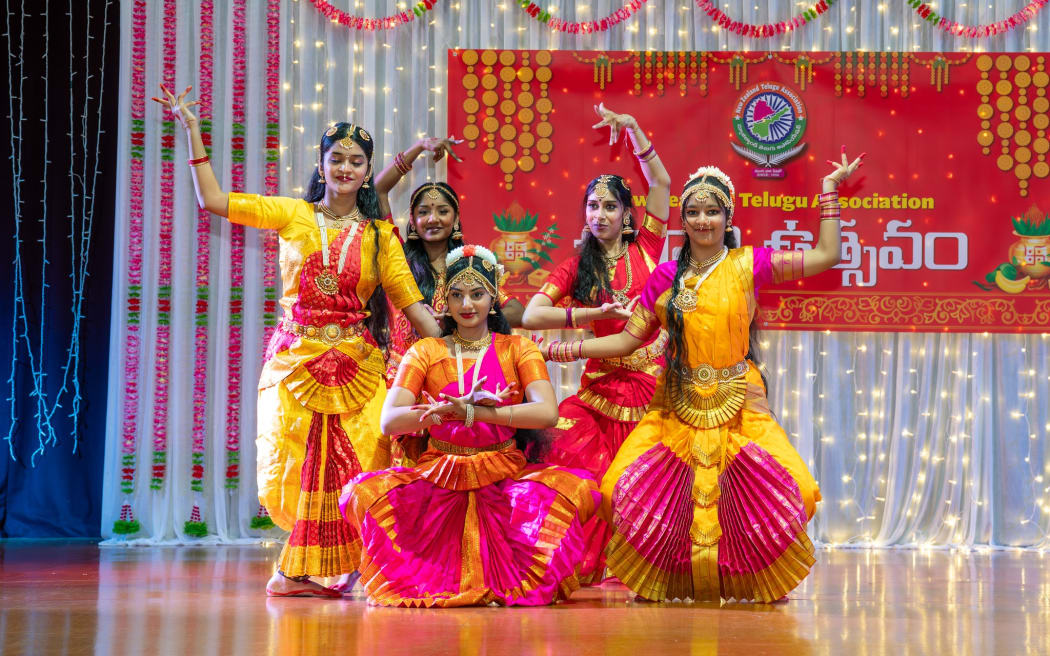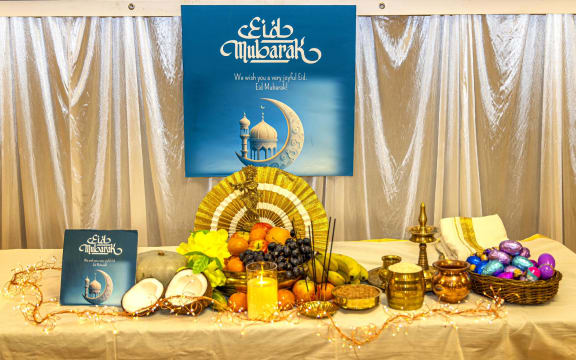
Members of the Telugu-speaking community of New Zealand celebrate the Telugu New Year. Photo: Supplied / New Zealand Telugu Association
New Zealand's diverse Indian community has celebrated a number of harvest and new year festivals in recent weeks, including Sikh Baisakhi, Telugu Ugadi and Malayali Vishu.
Cultural and climatic diversity
As a large agrarian country with immense cultural and climatic diversity, India has a plethora of harvest and new year festivals that are celebrated year-round, commemorating age-old tradition and religious practices.
Regional differences exist depending on whether households typically follow a lunar or solar calendar.
For those following the sun, the arrival of spring in the Northern Hemisphere signals the beginning of a new year, which typically falls in late March or early April.
Importantly, the festivals are called different names that change according to region.
Southern soul
The Malayali community from the southern Indian state of Kerala offered a poignant reminder of the subcontinent's diversity, celebrating Easter (a Christian festival), Eid al-Fitr (a Muslim festival) and Vishu (a Hindu festival) on 13 April.
The Christchurch Kerela Association organised the joint celebration in the Garden City, while the Auckland Malayali Samajam organised a similar event in the Tāmaki Makaurau suburb of Green Bay.

Offerings commemorating Eid al-Fitr, Vishu and Easter in Christchurch on 13 April. Photo: Supplied / Christchurch Kerala Association
As is widely known, Christians celebrate Easter to mark the death and resurrection of Jesus Christ, while Muslims celebrate Eid to mark the end of Ramadan - a month of fasting and reflection.
Meanwhile, Vishu is a Hindu festival celebrated in Kerala with sparkling lights and firecrackers to mark the beginning of a new year.
Vishukkani and Vishukaineetam are two key rituals celebrated during Vishu to bring good luck and prosperity to the community.
In Vishukkani, items symbolising prosperity are arranged around images of Lord Khrisna, an incarnation of the god Vishnu. Traditional oil lamps are then lit to help Vishnu see those items upon waking from a sleep, blessing them as he does so.
Vishukaineetam refers to a gift of coins - preferably gold - that is given to children by elders during the festival.
"(The joint celebration) showcased our rich cultural and social heritage to the members of other ethnic groups," said Mebin John, secretary of the Auckland Malayali Samajam. "It also proclaims the uniqueness of Auckland Malayali Samajam - unity in diversity."
The Auckland event featured cultural performances along with special programmes from children followed by dinner.
Anupama Amaldev, secetrary of the Christchurch Kerala Association, said all three festivals had their own traditions, customs and meaning.
"Coming together to share a meal and celebrate these festivals not only promotes cultural understanding but also emphasizes the common values of love, gratitude and community that are cherished across different faiths," Amaldev said.
Ugadi unity
Meanwhile, the Telugu-speaking community of New Zealand has also gathered in recent weeks to celebrate Ugadi - the Telugu New Year.
Ugadi marks the start of the Hindu New Year by recognising a change in the lunar orbit. It also signals the advent of spring in the Northern Hemisphere, typically falling around March and April.
Ugadi events in Auckland were organised by the Telegana Association of New Zealand and the New Zealand Telugu Association.
The Telugu Association South Island organised an event in Christchurch.
Apart from offering traditional Ugadi dinners and cultural performances, festivities also featured panchanga sravanam - astrological predictions by a priest for the following new year.
"Our Ugadi celebrations were attended by more than 800 members," said Suneel Kuncha, president of the New Zealand Telugu Association. "Such events provide a great opportunity for the members to meet with new immigrants and welcome them to our growing Telugu community in New Zealand."
Street processions
Last but not least, the Sikh community in New Zealand celebrated Baisakhi, or Vaisakhi, a harvest festival that doubles as the Sikh New Year.
Aligned with the solar calendar month of Vaishakha, the celebrations typically take place on 13 or 14 April.
The festival also marks the foundation of the Khalsa community of Sikhs, which is typically known as Khalsa Creation Day.
It was on 13 April 1699 that the 10th guru, Guru Gobind Singh, transformed the Sikhs into a family of soldier saints known as the Khalsa Panth.
The festival typically features street processions called nagar kirtan, in which devotees sing hymns from the Guru Grath Sahib, the Sikh holy book.
One of the largest processions in New Zealand took place in South Auckland on 6 April.
"It's remarkable to see how nagar kirtans have evolved in New Zealand over the years, from its humble beginnings in 1996 to this year's grand celebrations attended by thousands. The progress reflects the growing awareness and appreciation of cultural traditions," said Daljit Singh, president of the Supreme Sikh Society.
"Three decades ago, our dream of celebrating Sikh culture and tradition through nagar kirtan faced numerous challenges. The concept was unfamiliar to local authorities, including the police, business associations and the councils," Singh said.
"It took weeks of patient advocacy to pave the way for the very first parade. Fast forward now, the nagar kirtan has become a cherished tradition in Otahuhu, drawing people from all walks of life to celebrate diversity, unity and the spirit of community."
Similar events were organised in other cities, including celebrations in Hamilton organised by the Gurudwara Mata Sahib Kaur ji and Christchurch by the Gurudwara Singh Sabha.
